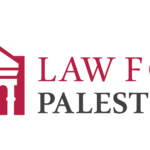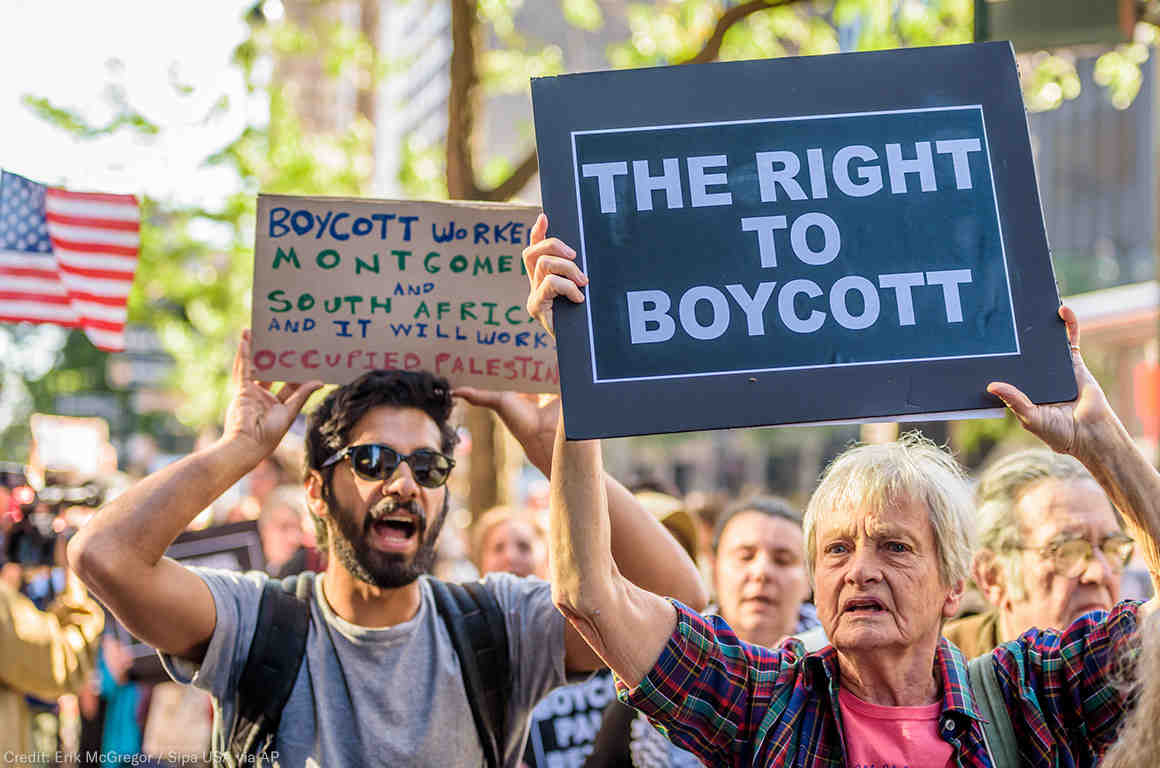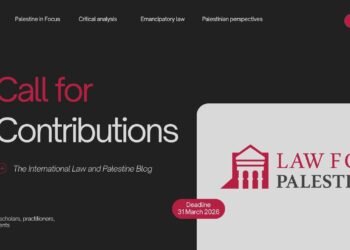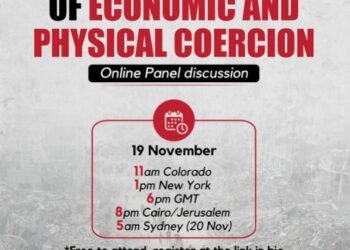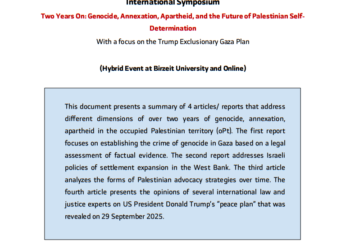The United States position on the BDS movement: An instrumental use of the law or a fair application of its rules?
By: Hiba Birat*
For: Law for Palestine
The global campaign for the Boycott, Divestment and Sanctions (BDS) of Israel was born under democratic principles and the principle of freedom of expression, according to the movement’s website. Its legitimacy is derived from a number of legal principles rooted in international law and its various instruments. The idea of the BDS emerged from the fact that Israel relied on external support in financing and sustaining its régime of settler colonialism and apartheid on Palestinian lands. Responding to this, more than 171 civil society bodies established what is known as the BDS movement in 2005. This was made in an attempt to combine civil, individual and institutional efforts in order to hold Israel accountable outside of official governmental channels, since these have failed for decades to end Israel’s injustices and crimes that violate the norms and charters of the international community. [1]
The BDS movement states that its aim is to exert pressure on Israel through peaceful means in order to force it to uphold its international obligations and to enable the Palestinian people to realize their right to self-determination. The movement’s three basic demands are:
“Ending the Israeli occupation and colonization of all Arab lands and dismantling the Wall”; “recognizing the fundamental rights of the Arab-Palestinian citizens of Israel to full equality”; and finally, “respecting, protecting and promoting the rights Palestinian refugees to return to their homes and properties as stipulated in UN Resolution 194”.
The International principles guaranteeing the movement’s legal legitimacy can be classified into two broad frameworks: the first addresses the formation and continuity of the movement, while the second deals with its objectives and principles. The movement derives the legitimacy for its formation and structure from the rights to freedom of expression, association and assembly, stipulated in several general and specialized international treaties. These rights also have been formalized as binding customary norms regardless of the position of States on the conventions containing these rights.
Article 19 of the International Covenant on Civil and Political Rights (ICCPR), to which the United States is a contracting party, usually constitutes a structural framework for such rights. The United Nations Human Rights Committee (UNHRC) considered the right to freedom of expression as the cornerstone of any democratic society, which was indicated by the inclusion of such rights in regional treaties, such as those establishing and governing the work of European, American and African human rights systems. In addition, the different national legislations and constitutions are hardly devoid of these rights.
The BDS movement’s three demands mentioned above are based on those international laws. Principles of equality and non-discrimination have formed the core of the early international norms and conventions, whether general such as the Universal Declaration of Human Rights and the ICCPR, or specialized like the International Convention on the Elimination of All Forms of Racial Discrimination (ICERD) and the International Convention on the Suppression and Punishment of the Crime of Apartheid (ICSPCA). Another tool that embodied such fundamental principals are the resolutions of the different UN organs and agencies, including but not limited to, those of the UN General Assembly (UNGA), the UN Security Council (UNSC) and the UNESCO, not to mention, the advisory opinion of the International Court of Justice (ICJ). Dozens of resolutions issued by the UN’s various organs have demanded an end to the Israeli occupation, and called for the return of refugees, the dismantling of the Wall, and the illegality of the settlements. [2]
The U.S. legal position on BDS
The United States has a rich history of economic boycott movements; both in the past, such as the Mississippi Civil Rights Movement in the 1960s, and in the present, such as the 2018 National Rifle Association (NRA) boycott. These movements have played a pivotal role in fighting racism and establishing fundamental rights in the United States of America. However, unlike the BDS, these movements were restricted to local activism, and their objectives and activities hardly exceeded the geographical boundaries of the United States. Therefore, they were unquestionably subject to the U.S. national legal system. However, can the same be said about a universal movement such as the BDS? Or does such international identity entail a different treatment?
The U.S. Constitution and its subsidiary legislation adopt principles similar to those of international law, regarding the right to freedom of expression and non-discrimination — both of which legitimize the work of the movement as we have already shown. However, these very principles were used in the U.S. to de-legitimize the movement. In other words, these principles were used to justify criminalizing the movement and suppressing its supporters, rather than recognizing the legitimacy of its activities and demands.
The U.S. legal position on the BDS can be divided into a federal and a state position. At the time of writing this article, attempts to outlaw the movement on a federal level had not gone beyond proposed bills. However, several individual states, most notably New York, New Jersey, Illinois, Florida, and Virginia, have enacted laws that effectively criminalized the movement and outlawed its activities.
“32 states in the US have adopted laws requiring a boycott of the BDS as a precondition to signing contracts or receiving government aid, with the 2017 Hurricane Harvey victims being a prime example”
Despite its failure to adopt a binding law criminalizing the BDS, the Congress has effectively facilitated the criminalization of the movement by individual states on local levels. This was made possible through influential members of the Senate proposing a bill to prevent the boycott of Israel. This bill allowed states to enact special laws that would obligate contractors to sign undertakings not to boycott Israel at the risk of terminating their contracts. Another bill criminalized the BDS movement and imposed a fine between USD 250,000 – 1,000,000 on individuals and institutions directly contracting with the government, or even receiving government aid.
As a result of these proposed bills, 32 states have adopted similar laws, requiring a boycott of the BDS as a precondition to signing contracts or receiving government aid, with the 2017 Hurricane Harvey victims being a prime example.
The laws against the BDS are based on two basic legal standards that fall within the framework of local state laws: religious and ethnic discrimination, and anti-Semitism. Other local and federal laws, such as the Fair Housing Act, have also been utilized in some cases, including that of AirBnb. The company declared its intention to delist rentals from West Bank settlements for violating Article 49 of the Fourth Geneva Convention, which prohibits the occupying power from deporting or transferring parts of its civilians to occupied territories.. However, the company was forced to reverse its ban after being the subject of several lawsuits and harassment.
Laws criminalizing the BDS have come under heavy criticism by rights groups. This wave of criticism was followed by the American Civil Rights Union filing several cases challenging the constitutionality of such laws since it flagrantly violates the right to freedom of expression protected under the First Amendment. While the right to freedom of expression in all its forms is protected by the American Constitution, a few instances constitute limitations on this protection. These are set out in a context of infringement on the rights of others, including hate speech, incitement and obscenity — subject to several conditions and limitations.
The U.S. Supreme Court has used the highest level of judicial review to examine the constitutionality of laws that limit freedom of expression. This test is known as Strict Scrutiny, to pass strict scrutiny, the government, whether federal or local, is required to prove that it has passed the law to further “a compelling state interest” and that it has narrowly tailored the law to achieve that interest using the least restrictive means. The government is also required to show that its compelling interest, which mostly includes the protection of fundamental and absolute rights, can only be protected by restricting freedom of expression. Otherwise, the court rejects that restriction, considers it unconstitutional, and orders the law revoked.
The U.S. Supreme Court has dealt with cases of economic boycott movements before. For instance, it acknowledged the lawfulness of the general boycott of the white economy led by the National Association for the Advancement of the Rights of Colored People (NAACP v. Claiborne Hardware 1982) that lasted for several years in Mississippi during the 1960s. In an attempt to advocate rights of African Americans to full equality and to end racial discrimination at the time, the court acknowledged that this economic boycott falls within the right to freedom of expression guaranteed under the Constitution’s First Amendment. It also considered that the protection of the right to boycott as a form of political expression came prior to that of individual expression, because it aimed to change public opinion and discriminatory policies.
“The U.S. Supreme Court acknowledged the lawfulness of the general boycott of the white economy led by the National Association for the Advancement of the Rights of Colored People during the 1960s”
Based on the above, state governments that have enacted laws against the BDS must show a compelling interest that is a fundamental and absolute right to only be protected through these legislations that restrict the right of individuals and institutions to freedom of expression. In fact, most of those states used racial and religious discrimination as a legal basis to justify such legislation. This was possible because the U.S. law criminalizes any form of discrimination, hatred, or violence directed against individuals or groups based on race, ethnicity, religion or homeland.
As stipulated in federal and local legislations, most notably the Civil Rights Act of 1964, American institutions are prohibited from discriminating on the basis of race, religion, gender, or national origin. This prohibition has been a solid foundation for enacting laws that limit the right to freedom of expression, only when it is proven to restrict fundamental rights. However, and due to several reasons, such prohibition is not applicable to BDS case.
To prove discrimination in U.S. law one has to show evidence of two main components of the crime: a discriminatory intent and a discriminatory/disparate impact. In order to prove the intent to discriminate, one of two proofs must be presented: either direct or indirect (circumstantial) evidence. The former can be shown, in our case, by demonstrating clear and direct practice of discrimination through the movement’s literature, statements and actions,. The latter, known as circumstantial evidence, does not rely on clear and specific facts, but on the circumstances surrounding these facts. As valid as direct evidence, circumstantial evidence has to be cogent and compelling.
The BDS does not target people based on their ethnic or national affiliations, nor does it target Jews because of belonging to a particular religion. Rather, it targets entities and individuals based on their active participation in violating the rules of international law and undermining the rights of the Palestinians. This means that some of the entities and individuals the movement targets are neither Israeli nor even Jewish. The only criterion BDS targets have in common is their complicity in financing or supporting Israel’s régime of apartheid in the occupied territories.
Consequently, direct evidence fails to prove discriminatory intent of the BDS movement. Indirect evidence also fails to prove discrimination on the part of the movement. That is to say, targeting the policies of a state is not tantamount to discrimination against the citizens of that state. Hence, this case is completely different from discrimination against individuals because of being citizens of that state.
To examine the discriminatory impact of the BDS activities, one to indicate the rule of necessity which had been previously used by the U.S. courts when adjudicating cases of discrimination. . This rule, stipulated in the provisions of the Civil Rights Act 1964 , states that an action which would normally be discriminatory and thus in contravention of established norms and conventions may be deemed legal if it serves to uphold fundamental constitutional principles. This rule is invoked in response to claims of disparate impact, as stated in the texts of the law. This means that the discrimination against Jewish communities in Israel comes as an inevitable impact, and cannot take precedence over the BDS activities, which are only intended as a means of peaceful pressure to urge Israel to fulfill its international obligations.
A final point to be made here is that under anti-Semitism laws, some states have adopted a common basis with other countries that sought to criminalize the BDS movement, such as Germany, France and others; despite the fact that the European Court of Human Rights considered the BDS campaign to be legal in relation to European laws. The definition of anti-Semitism, however, was expanded in the American legal system to include anti-Zionism. This was done under what is known as the three Ds, standing for: “demonizing, delegitimizing and double standard dealing with Israel.” Along with a number of other countries, the U.S. Department of State set a common definition that includes examples that clearly tend to immunize Israel against criticism under the pretext of anti-Semitism.
Although this definition does not have a mandatory legal force, it is used as a guide in considering cases involving suspicion of anti-Semitism. Consequently, the controversy surrounding the clear difference between anti-Semitism and anti-Zionism is turned into a sophistic political debate that is systematically ignored in the American legal corridors. This is happening while influential Jewish groups and institutions have joined the BDS movement, and while the movement itself has reiterated its rejection of discrimination based on race and religion. Its activities only target the significant minority directly involved in violating the rights of Palestinians and violating the principles of international law.
Therefore, it seems that the United States has spared no effort to criminalize the BDS movement, not only by ignoring the accredited interpretations of the principles of international law on the right to boycott, but also by ignoring its own jurisprudence legalizing other boycott movements in the past. the U.S. has twisted these local rules on the right to boycott, more importantly, it has turned rules previously considered a solid basis for the protection and support of the movement, such as freedom of expression and non-discrimination, into political tools function as a means to criminalize the movement’s efforts and limit its popular base.
—
[1] What is the Boycott Israel BDS movement? https://bdsmovement.net/what-is-bds
[2] The most important UN resolutions adopted in this regard are UNSC Resolutions 242 and 2234, UNGA Resolution 194, and the 2004 advisory opinion by the ICJ on the illegality of the Separation Wall.

* Hiba Birat is a member of the expert committee of the Legal Forum for Palestine, which is part of the Law for Palestine Organization. She is a licensed attorney in the state of New York, holds a master’s degree from the Washington School of Law-American University in International Law and Human Rights, and has worked as a legal researcher in a number of civil society organizations in New York and New Jersey. She started a legal blog of the Palestinian American Center in New Jersey, and currently heads the Jerusalem website, also affiliated with the Palestinian American Center.

